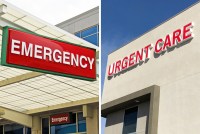Latest KFF Health News Stories
Readers and Tweeters Urgently Plea for a Proper ‘Role’ Call in the ER
KHN gives readers a chance to comment on a recent batch of stories.
Desde el 1 de enero, California se sumó a otros 45 estados y al Distrito de Columbia con leyes que permiten a una persona tomar decisiones en nombre de un paciente, incluso si no estaba autorizada por el paciente antes de que ocurriera la situación médica.
California Requires Hospitals to Turn to a Patient’s Next of Kin, Closing a Longtime Loophole
A state law establishes a list of representatives who can make medical decisions for patients unable to convey their wishes. California is late to making the change; 45 other states and the District of Columbia already have next-of-kin laws.
When Medicare stops paying for a pricey drug that prolongs life, an Ohio man considers giving up treatment to spare his family enormous debt.
Doctors Are Disappearing From Emergency Rooms as Hospitals Look to Cut Costs
As a money-saving strategy, emergency rooms are turning to nurse practitioners, physician assistants, and other staffers who earn far less than physicians.
Montana’s Tax-Exempt Hospitals Oppose Increased Oversight by State Officials
As Montana officials seek to make nonprofit hospitals prove the benefits they provide the community justify their tax exemptions, industry leaders propose their own changes — which state officials say would further limit the state’s authority.
A Baby Spent 36 Days in an In-Network NICU. Why Did the Hospital Next Door Send a Bill?
A baby spent more than a month in a Chicago NICU. A big bill revealed she was treated by out-of-network doctors from the children’s hospital next door. Her parents were charged despite a state law protecting patients from such out-of-network billing — and sent to collections when they didn’t pay up.
The debt ceiling crisis facing Washington puts Medicare and other popular entitlement programs squarely on the negotiating table this year as newly empowered Republicans demand spending cuts. Meanwhile, as more Americans than ever have health insurance, the nation’s health care workforce is straining under the load. Joanne Kenen of the Johns Hopkins Bloomberg School of Public Health and Politico, Tami Luhby of CNN, and Victoria Knight of Axios join KHN’s chief Washington correspondent Julie Rovner to discuss these topics and more. Plus, for extra credit, the panelists recommend their favorite health policy stories of the week they think you should read, too.
Readers and Tweeters Diagnose Greed and Chronic Pain Within US Health Care System
KHN gives readers a chance to comment on a recent batch of stories.
Ending Involuntary Commitments Would Shift Burden of Dementia Care to Strapped Communities
Health department officials anticipate having to transfer two dozen patients from the Montana State Hospital to another state-run facility if a bill to end involuntary commitments passes.
Despite Doctors’ Concerns, University of California Renews Ties With Religious Affiliates
The public university’s health system is renewing contracts with outside hospitals and clinics even as some doctors and faculty say clearer language is needed to protect physicians performing abortions and gender-affirming treatments.
¿Clínica de urgencias o sala de emergencias? Cómo decidir donde recibir la atención adecuada
Las personas heridas o enfermas deben decidir con cuidado, en un momento de estrés, cuál es el mejor lugar para buscar ayuda. Y deben tomar esa decisión en medio de un número creciente de opciones.
The Decision of Where to Seek Care Is Complicated by the Multitude of Options
The proliferation of care options — particularly urgent care centers and free-standing emergency departments — can make the head spin. Facilities have little incentive to clear up the confusion of where to go. But for patients, the wrong choice can mean big bills and possibly poor health outcomes.
Hospitals’ Use of Volunteer Staff Runs Risk of Skirting Labor Laws, Experts Say
Hospitals using volunteers is commonplace. But some labor experts argue that deploying unpaid workers to do work that benefits the organization’s bottom line lets for-profit hospitals skirt federal labor laws, deprives employees of work, and potentially exploits the volunteers.
Medicaid and Abortion Top Health Agenda for Montana Lawmakers
State lawmakers say their health care goals for the new legislative session are to lower costs and improve access to care. They’ll have to grapple with a full slate of other issues, as well.
ER Doctors Call Private Equity Staffing Practices Illegal and Seek to Ban Them
Doctors, consumer advocates, and some lawmakers are looking forward to a California lawsuit against private equity-backed Envision Healthcare. The case is part of a multistate effort to enforce rules banning corporate ownership of physician practices.
The Case of the Two Grace Elliotts: A Medical Billing Mystery
A health system charged a woman for a shoulder replacement at a hospital across the country that she had not visited for years. She didn’t receive the care, but she did receive the bill — and the medical records of a stranger.
An Air Force Career Held up Because of Debt Owed for Medical Bills
Emergency room care left Samaria Bradford with $5,000 in medical bills. Now she has to track down and pay that debt before she can hope to enlist in the military.
A Retiree Returns to Work After a Calamitous Year of Health Emergencies
In 2020, diabetes and covid-19 landed David Zipprich in the hospital three times. Even with insurance, he was inundated with bills, debt notices, and calls from collectors.
Hundreds of Hospitals Sue Patients or Threaten Their Credit, a KHN Investigation Finds. Does Yours?
An examination of billing policies and practices at more than 500 hospitals across the country shows widespread reliance on aggressive collection tactics.























